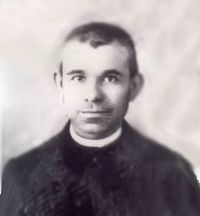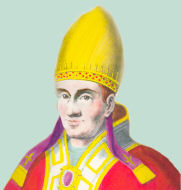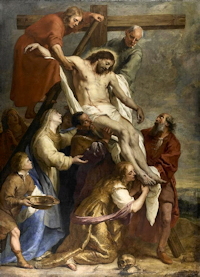Lent: March 12th
Friday of the Second Week of Lent
Other Commemorations: St. Luigi Orione, Priest (RM); St. Innocent I, Pope (RM)
» Enjoy our Liturgical Seasons series of e-books!
"Therefore, I say to you, the Kingdom of God will be taken away from you and given to a people that will produce its fruit."(Mt. 45) The Jews, the members of the chosen race, proved unworthy of Christ's message which henceforth was to be joyfully received by the Gentiles. Do not converts often prove more appreciative of, and practice better, the Catholic religion than those who have always been members of the Church?
The feast of St. Gregory the Great has been transferred to September 3.
The Station for today is in the church of St. Vitalis, martyr, the father of the two illustrious Milanese martyrs, Sts. Gervasius and Protasius.
Meditation
"In today's Gospel we have more than the mere gigues of the old Law, which show us our Redeemer in the far distant future; we have the great reality. Yet a little while, and the thrice holy Victim will have fallen beneath the blows of His persecutors. How awful and solemn are the words of Jesus, as His last hour approaches! His enemies feel the full weight of what He says; but, in their pride, they are determined to keep up their opposition to Him, who is the Wisdom of the Father. They have made up their minds not to acknowledge Him to be what they well know He is—the stone, on which he that falls shall be broken, and which shall grind to powder him on whom it shall fall. But what is the vineyard, of which our Lord here speaks? It is revealed truth; it is the rule of faith and morals; it is the universal expectation of the promised Redeemer; and, lastly, it is the family of the children of God, His inheritance, His Church.
"God had chosen the Synagogue as the depository of such a treasure; He willed that His vineyard should be carefully kept, that it should yield fruit under their keeping, and that they should always look upon it as His possession, and one that was most dear to Him. But, in its hard-heartedness and avarice, the Synagogue appropriated the Lord's vineyard to itself. In vain did He, at various times, send His prophets to reclaim His rights; the faithless husbandmen put them to death. The Son of God, the Heir, comes in Person. Surely, they will receive Him with due respect, and pay Him the homage due to His divine character! But no; they have formed a plot against Him; they intend to cast Him forth out of the vineyard, and kill Him." — The Liturgical Year, Abbot Gueranger O.S.B.
"Therefore, I say to you, the Kingdom of God will be taken away from you and given to a people that will produce its fruit." (Mt. 45)
"You [gentiles] are to be keepers of the vineyard to the end of time; you are to feed on its fruits, for they now belong to you. From east and west, from north and south, come to the great Pasch, that is being prepared! Come to the font of salvation, O ye new people, who are gathered unto God from all nations under the sun! Your mother the Church will fill up from you, if you be faithful, the number of the elect; and when her work is done, her Spouse will return, as the dread Judge, to condemn those who would not know the time of their visitation." — The Liturgical Year, Abbot Gueranger O.S.B.
Things to Do:
- Today is a day of abstinence from meat. Try one of the meatless dishes for dinner tonight from our recipes section.
- Let your children participate more actively in the family's weekly Stations of the Cross: obtain a Stations of the Cross coloring book (available online on various Catholic websites) and have your children color them in. Here are all fourteen Stations of the Cross in a printable format. Your children can color these and even write the prayers for each Station. Here is a version of the Stations with bigger pictures for even younger children (grades 1 to 3) that has also been made available online.
- Make a family Holy Hour this evening, perhaps in conjunction with the Stations of the Cross.
St. Luigi Orione
 Luigi Orione was born in Pontecurone, diocese of Tortona, on 23 June 1872. At thirteen years of age he entered the Franciscan Friary of Voghera (Pavia), but he left after one year owing to poor health. From 1886 to 1889 he was a pupil of Saint John Bosco at the Valdocco Oratory (Youth Centre) in Turin.
Luigi Orione was born in Pontecurone, diocese of Tortona, on 23 June 1872. At thirteen years of age he entered the Franciscan Friary of Voghera (Pavia), but he left after one year owing to poor health. From 1886 to 1889 he was a pupil of Saint John Bosco at the Valdocco Oratory (Youth Centre) in Turin.
On 16 October 1889, he joined the diocesan seminary of Tortona. As a young seminarian he devoted himself to the care of others by becoming a member of both the San Marziano Society for Mutual Help and the Society of Saint Vincent de Paul. On 3 July 1892 he opened the first Oratory in Tortona to provide for the Christian training of boys. The following year, on 15 October 1893, Luigi Orione, then a seminarian of twenty-one, started a boarding school for poor boys, in the Saint Bernardine estate.
On 13 April 1895, Luigi Orione was ordained priest and, on that occasion, the Bishop gave the clerical habit to six pupils of the boarding school. Within a brief span of time, Don Orione opened new houses at Mornico Losana (Pavia), Noto - in Sicily, Sanremo and Rome.
Around the young Founder there grew up seminarians and priests who made up the first core group of the Little Work of Divine Providence. In 1899, he founded the branch of the Hermits of Divine Providence. The Bishop of Tortona, Mgr Igino Bandi, by a Decree of 21 March 1903, issued the canonical approval of the Sons of Divine Providence (priests, lay brothers and hermits) - the male congregation of the Little Work of Divine Providence. It aims to "co-operate to bring the little ones, the poor and the people to the Church and to the Pope, by means of the works of charity," and professes a fourth vow of special "faithfulness to the Pope." In the first Constitutions of 1904, among the aims of the new Congregation, there appears that of working to "achieve the union of the separated Churches."
Inspired by a profound love for the Church and for the salvation of Souls, he was actively interested in the new problems of his time, such as the freedom and unity of the Church, the Roman question, modernism, socialism and the Christian evangelization of industrial workers.
He rushed to assist the victims of the earthquakes of Reggio and Messina (1908) and the Marsica region (1915). By appointment of Saint Pius X, he was made Vicar General of the diocese of Messina for three years.
On 29 June 1915, twenty years after the foundation of the Sons of Divine Providence, he added to the "single tree of many branches" the Congregation of the Little Missionary Sisters of Charity who are inspired by the same founding charism. Alongside them, he placed the Blind Sisters, Adorers of the Blessed Sacrament. Later, the Contemplative Sisters of Jesus Crucified were also founded.
For lay people he set up the associations of the "Ladies of Divine Providence," the "Former Pupils," and the "Friends." More recently, the Don Orione Secular Institute and the Don Orione Lay People's Movement have come into being.
Following the First World War (1914-1918), the number of schools, boarding houses, agricultural schools, charitable and welfare works increased. Among his most enterprising and original works, he set up the "Little Cottolengos," for the care of the suffering and abandoned, which were usually built in the outskirts of large cities to act as "new pulpits" from which to speak of Christ and of the Church - "true beacons of faith and of civilization."
Don Orione's missionary zeal, which had already manifested itself in 1913 when he sent his first religious to Brazil, expanded subsequently to Argentina and Uruguay (1921), Palestine (1921), Poland (1923), Rhodes (1925), the USA (1934), England (1935), Albania (1936). From 1921-1922 and from 1934-1937, he himself made two missionary journeys to Latin America: to Argentina, Brazil and Uruguay, going as far as Chile.
He enjoyed the personal respect of the Popes and the Holy See's Authorities, who entrusted him with confidential tasks of sorting out problems and healing wounds both inside the Church as well as in the relations with society. He was a preacher, a confessor and a tireless organizer of pilgrimages, missions, processions, live cribs and other popular manifestations and celebrations of the faith. He loved Our Lady deeply and fostered devotion to her by every means possible and, through the manual labor of his seminarians, built the shrines of Our Lady of Safe Keeping in Tortona and Our Lady of Caravaggio at Fumo. In the winter of 1940, with the intention of easing the heart and lung complaints that were troubling him, he went to the Sanremo house, even though, as he said, "it is not among the palm trees that I would like to die, but among the poor who are Jesus Christ." Only three days later, on 12 March 1940, surrounded by the love of his confreres, Don Orione died, while sighing "Jesus, Jesus! I am going."
His body was found to be intact at its first exhumation in 1965. It has been exposed to the veneration of the faithful in the shrine of Our Lady of Safe Keeping in Tortona ever since 26 October 1980 - the day in which Pope John Paul II inscribed Don Luigi Orione in the Book of the Blessed. He was canonized on 16 May 2004.
—© Libreria Editrice Vaticana
Highlights and Things to Do:
- Read more about St. Luigi Orione:
- Find out more about The Sons of Divine Providence, the order founded by St. Luigi, and their work, Orionecare. See also the Italian main site.
- St. Luigi's body was found intact when exhumed in 1965. His remains are now interred at the shrine of Our Lady of Safe Keeping, Tortona, Italy.
St. Innocent I
 Innocent was born in Albano, Italy. He lived during the time of Saints Jerome and Augustine. He became Pope, on December 22, 401. Jerome, writing to the virgin Demetrias, says of him: "Hold fast to the faith of holy Innocent, who is the son of Anastasius of blessed memory and his successor in the apostolic throne; receive no strange doctrine, however shrewd and prudent you may think yourself."
Innocent was born in Albano, Italy. He lived during the time of Saints Jerome and Augustine. He became Pope, on December 22, 401. Jerome, writing to the virgin Demetrias, says of him: "Hold fast to the faith of holy Innocent, who is the son of Anastasius of blessed memory and his successor in the apostolic throne; receive no strange doctrine, however shrewd and prudent you may think yourself."
During his pontificate, Innocent emphasized papal supremacy, praising the bishops of Africa for referring the decrees of their councils at Carthage and Milevis in 416 that condemned Pelagianism, to the pope for confirmation. This confirmation stirred St. Augustine to pen his famous remark: "Roma locuta, causa finita est" (Rome has spoken, the matter is ended).
Innocent was pope during the capture and sack of Rome by the Goths under Alaric in 410. He condemned the heresies of Pelagius and Celestinus, decreeing that children, even though born of a Christian mother, must be born again by water, in order that their second birth may cleanse away the stain they have contracted by the first. He also approved the observance of fasting on the Saturday in memory of the burial of Christ our Lord. He fought the unjust removal of Saint John Chrysostom and spoke strongly in favor of clerical celibacy. He sat fifteen years, one month, and ten days. Innocent died in Rome, March 12, 417 and was buried in the cemetery called ad Ursum Pileatum.
—Some material excerpted from The Liturgical Year, Abbot Gueranger O.S.B.
Symbols and Representation: Angel holding a crown.
Highlights and Things to Do:
- Read four letters of Correspondence between Innocent and Saint John Chrysostom.
- Read more about St. Innocent I:






